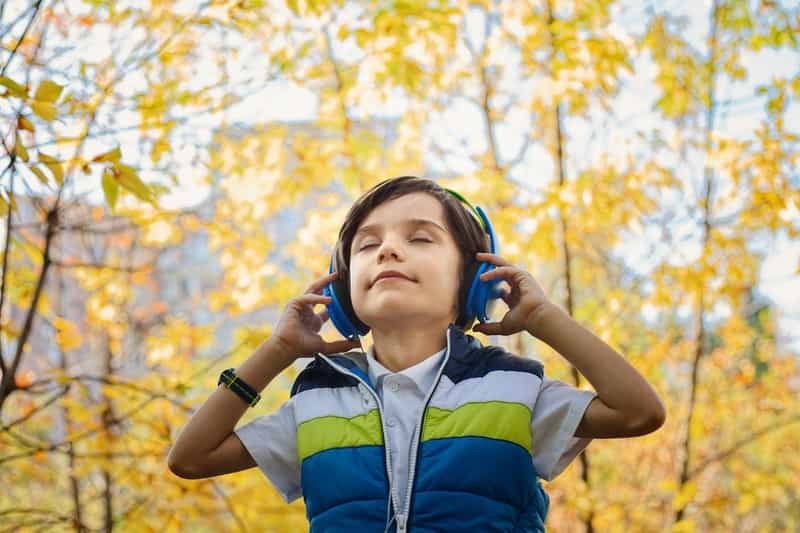Human beings cannot function without music. Reading this statement, you may have some doubts, but it’s true. Music has always played some role in human history, offering something from enjoyment to emotional comfort. It is one of the most accessible art forms that has helped us stay connected. Most people associate music with the sense of emotional response it tends to give.
Elements of varying degrees found in music can affect mood—from excitement to providing a sense of calmness. The rhymes, rhythms and melodies enhance our brain function and the way we communicate.
Music allows us to feel every kind of emotion, from happiness to sadness and plays a significant role in helping shape the lives of children. It impacts a child’s brain development—from intellectual to social-emotional, motor, and cognitive function.
While it is often difficult to calm down a distressed child, music can help. Often parents are unaware of the benefits of teaching music to children except that it is considered as enjoyment. However, professional guidance can be crucial to a child’s physical and mental development, especially if they’re already interested.
If you’re based out of Colorado and want your child to take music classes in the Boulder area, there are plenty of options available. If you’re wondering how music classes help children, here are a few ways that show how music positively impacts a child.
Improves Memory
Everybody is aware of how memory plays a significant role in our lives. It is impossible to store and pass down information from generation to generation unless an individual has a good memory. Music and memory are closely related to each other. Memory is the root of all mental tools and is helpful in every aspect of daily life.
Young minds are capable of storing excessive information and as every school subject works on the principle of receiving and storing information, it is crucial that children’s minds work efficiently. That is why many experts believe that exposing your child to music alters their brain function that contributes to improved memory.
Several studies show that music improves a child’s memory recall ability and improves their attention span. If we look at the brain of a young child, some vital neural pathways are still under development that play a significant role in the function of the brain throughout life. However, with the help of music, these pathways take less time to develop.
Teaching or allowing kids to listen to music speeds up neural development, improving working memory.
Enhances Creativity
The process of learning from music does not occur through a predetermined method. Children are at an age where their mind wants to explore the world and experience adventures every day. Similarly, when young minds are given the opportunity to play without any rules, they can explore new musical knowledge and learn through practice and innovation.
Creativity is all about exposing yourself to the surroundings and taking in every experience that comes your way. Music is a form of art that promotes intrinsic and unique qualities in young learners. When children listen to music, they are encouraged to bring out their creative side, depicted through dance moves, new notes and fresh lyrics.
Develops Social Skills
While growing up, children naturally prefer environments where they feel confident and are familiar with their surroundings. Many kids face difficulty adapting socially, but if they’re interested in music, music classes give them a platform to not only showcase their talent but mingle and make new friends.
Being a part of a group teaches a child how to work in a team, improve leadership skills, and most significantly appreciate others. While every form of music narrates a story, it allows children to be more empathetic and social towards others.
Music activates brain areas concerned with the feelings of others, so when a child learns to play the music, they are also better able to tap into people’s emotion.
Builds Confidence
Motivation is a huge factor that determines a child’s performance in school. If a child is experiencing confidence issues, learning to play an instrument instills the confidence to face challenges bravely.
Children need to trust their abilities, which music helps them with. Children experiencing low self-esteem tend to second guess themselves, which is why they lack confidence. Engaging them through art, especially through music, helps them develop a positive outlook towards life and gives them a sense of purpose.
Confidence often develops when a child has mastered the skill of playing an instrument, so when the time comes to play in front of the audience, children trust their abilities and perform well without any hesitation.
Conclusion
Music is not only fun for kids; it is also good for their overall development. Even before a child is born, the sounds of surroundings help develop neural pathways necessary for speaking and listening. The development of these pathways also helps improve a child’s cognitive functioning. Music also plays a significant role in learning language and vocabulary.
Repetition of words in rhymes or songs enables the child to memorize them. Building confidence and enhancing creativity are among the few benefits of exposure to music. While some parents might consider music as only a fun activity for kids, it has several benefits that help a child learn important skills necessary to live a good life.


